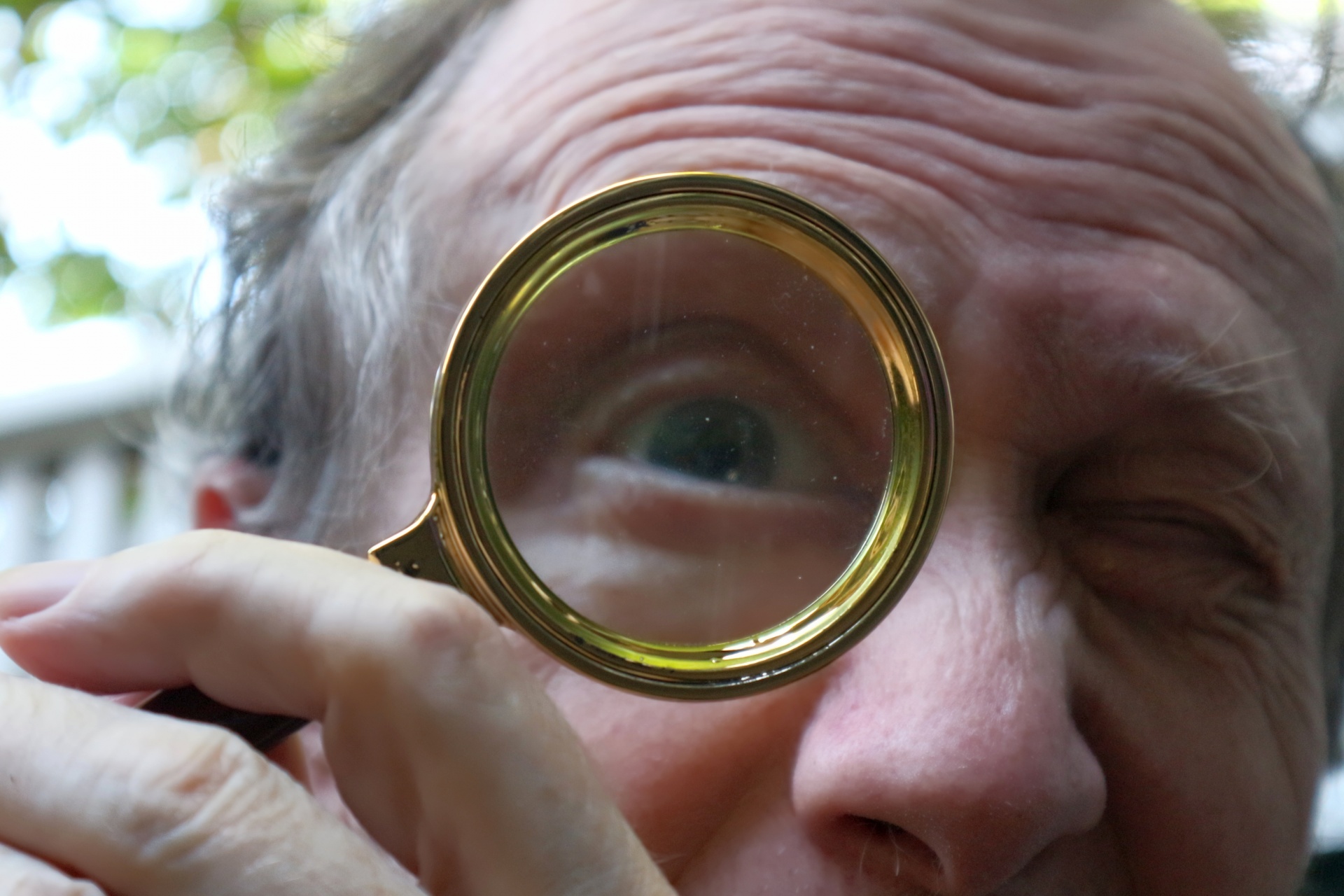
Do you need must have good English for work?
Does your English make your boss cry?
Do small children speak better English than you?
Master Fluent English
by Mr. Vig

Do you need must have good English for work?
Does your English make your boss cry?
Do small children speak better English than you? Read More >
by Mr. Vig
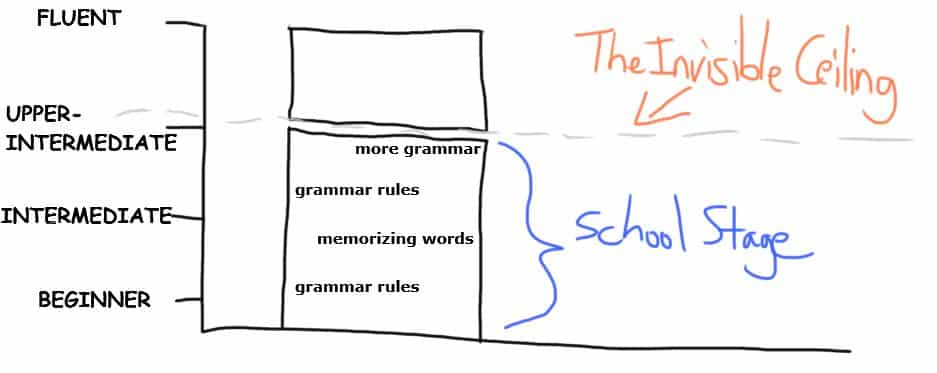
[social_sharing style=”style-21″ fb_like_url=”https://rviguerie.wpengine.com/5-missing-pieces-fluency/” fb_color=”light” fb_lang=”en_GB” fb_text=”like” fb_button_text=”Share” tw_lang=”en” tw_button_text=”Share” g_lang=”en-GB” g_button_text=”Share” alignment=”left”]
When I was a kid I wanted to be black belt in karate.
So I signed up for lessons. Read More >
by Mr. Vig
by Mr. Vig
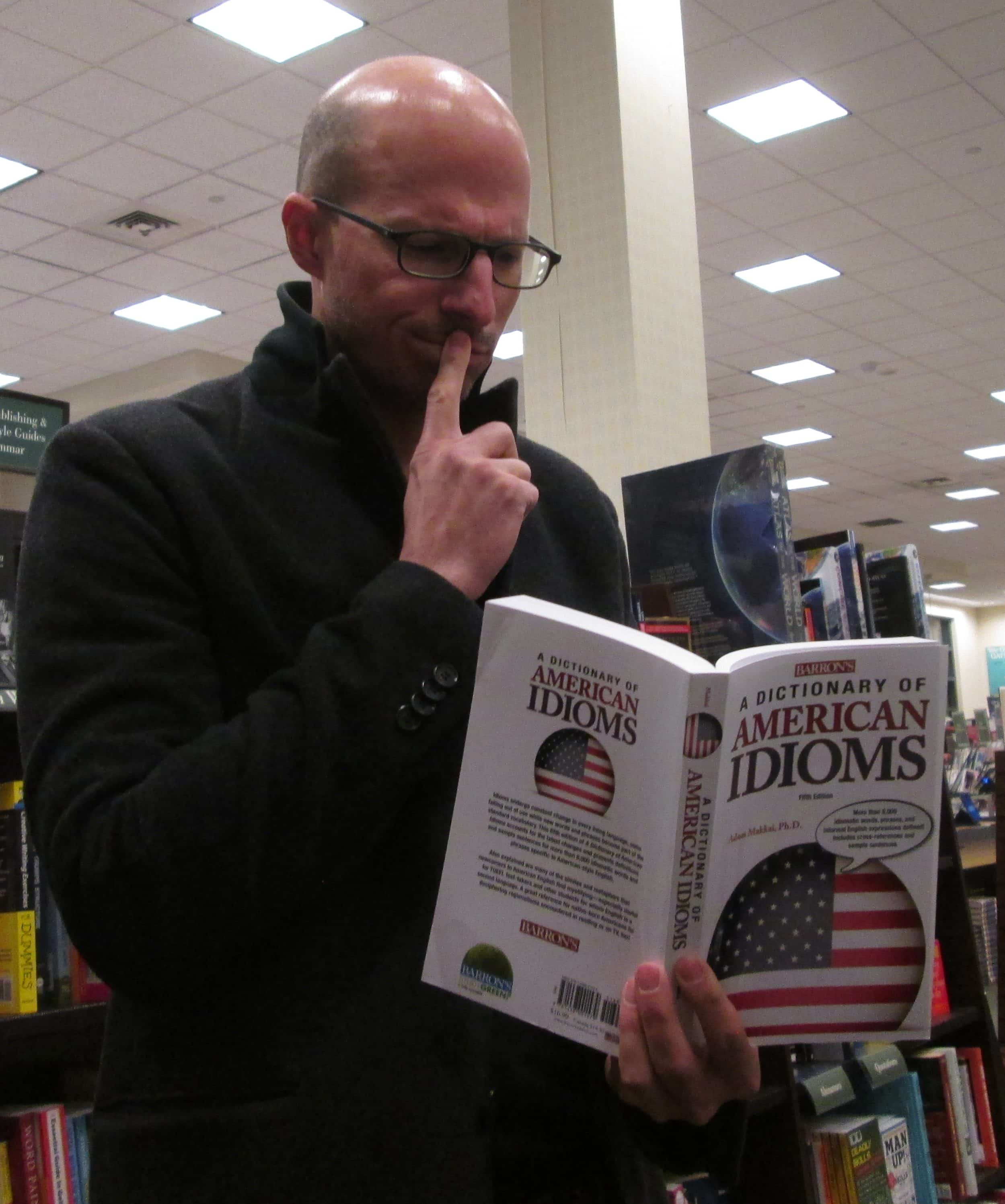
Greetings from the US!
I went home to Virginia for the holidays this year.
And while visiting my sister, I decided to check out a local book store.
Of course, I went right to the language section.
What did I find?
The same boring grammar books and lists of idioms I see students in Europe reading!
If you know my blog, then you know that one of the basic ideas I teach is that you should run away from anything boring.
And run away fast.
Because boredom is the enemy of learning and remembering.
We pay attention to what’s interesting and forget and avoid whatever is boring.
And if you choose a boring book – like A Dictionary of American Idioms (zzzzzz) – that’s a bad idea because you’ll quickly become bored, you’ll stop reading, and your English will get worse.
So what’s the solution?
Every bookstore sells books which can improve your English vocabulary.
Just reading one of these books will help you learn and remember useful, native speaker vocabulary.
But these books are not in the language section…
Where are they?
They’re everywhere else!
They’re fiction books… biography… humour… personal growth… fantasy… yoga for mothers…
In fact, any book that’s not in the language section!
Why?
Because although reading is one of the best ways to improve your English vocabulary…
(According to one research study, adults learned 45 words from reading just one short novel. *)
It MUST be something you’re interested in.
If it’s not, then you’ll become bored, stop reading, and your English will get worse.
Make sense?
Good!
Because I stayed with my sister and her family last week, and because she’s a school teacher, and because your reading should also be easy, I asked her to recommend some books.
These are her top two choices for easy reading:
One of my sister’s favorite books. All her kids read it, and I read it too when I was little. (I liked it, but I think it’s more of a girl’s book.)
It’s the true story about a girl who moves with her family to the American frontier (out west) before there were railroads or electricity.
The TV show based on the book was something my family watched every week.
This one, I remember, I liked more. It’s definitely a boy’s story.
In the 1860s, when Europe still had kings and queens, a boy and his dog hunt in the wilderness of Texas.
Happy reading!
*Saragi, U., P. Nation, and G. Meister. 1978. Vocabulary learning and reading. System 6: 70-78
by Mr. Vig
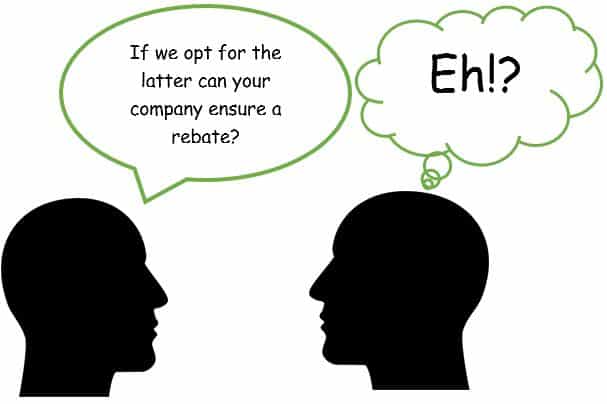
[social_sharing style=”style-21″ fb_like_url=”https://rviguerie.wpengine.com/business-english-vocabulary/” fb_color=”light” fb_lang=”en_GB” fb_text=”like” fb_button_text=”Share” tw_lang=”en” tw_button_text=”Share” g_lang=”en-GB” g_button_text=”Share” alignment=”left”]
(NOTE: The link for the words is at the bottom of the article. Or click here to get them now.)
How many words are in the English language?
The answer: a lot!
171,476, to be exact.
(At least that’s the number of words in the Oxford English Dictionary.)
And that’s a little depressing for any non-native speaker who wants to improve his or her vocabulary.
But here’s the good news.
You don’t need to know all those words.
You don’t even need to know half…
or 25%…
or 10%…
If you want to read about business, talk about business, and do business in English, you only need to know less than 3% of the English vocabulary to understand 97% of business communication.
How is that possible?
Native speakers like to repeat themselves.
We say the same words over and over again.
When it comes to choosing our words, we’re all vocab environmentalists recycling our words.
So while this is how most people think of the English language:
In fact, it’s more like this:
And it’s the same in the business world.
Earlier this year, a team of English language researchers in Japan discovered that if you know only 2,144 English words you can understand 92% of conversation.
And an additional 1,700 business words will buy you 97% understanding.*
But…they have to be the right words.
Here’s the story:
The researchers took a lot of business magazines…
They took a lot of business books…
They took a lot of business newspapers and websites…
(And by “a lot” I mean 64 million words in total.)
And they dumped all these business words into a blender.
(Or maybe it was a computer…)
And they asked the question:
“What are the words that rise to the top?”
They wanted to know the most common…the most frequent…the most valuable words for business in the English language today.
A list of the only English words a businessman or woman could ever need.
Researches call them “frequency lists.”
But I call them “super words.”
Ready to find out how many you know?
Click here to get you Super Business Word Checklist.
*https://www.newgeneralservicelist.org/
Image of The Economist by Lynette taken from Flickr, under Creative Commons licence.
Image of The Effective Executive from Harper Collins.
by Mr. Vig
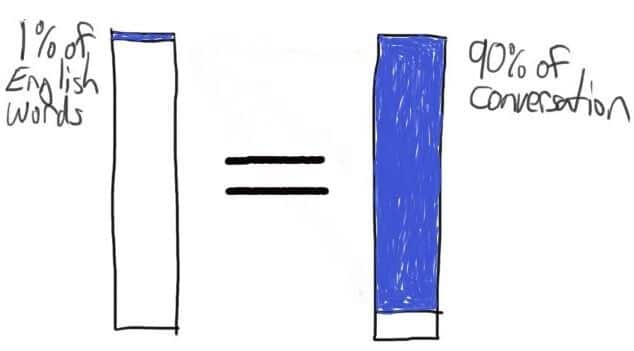
Ever heard of the 80/20 rule?
If you haven’t get ready.
This simple idea has changed lives, transformed businesses and it can improve your English faster than ever.
About 100 years ago, an Italian economist named Vilfredo Pareto was studying public records in England when he found something interesting:
80% of the nation’s wealth was owned by just 20% of the population.
“That’s strange,” he thought. “So unbalanced. Something must be wrong.”
So he looked at older recorders. A hundred years ago…two hundred…
But he kept discovering the same 80/20 ratio.
He still thought something must be wrong, so he travelled to other cities in Europe to look at their statistics.
But wherever he travelled he found the same two numbers.
Then he started seeing this ratio wherever he looked.
It seemed to be a universal principal.
One of the hidden laws of the universe…
Interesting.
But when businesses discovered it…
Valuable!
In the 1950s the Romanian-American engineer Joseph Juran tried to teach 80/20 thinking to American businesses.
But they weren’t interested.
So he went to Japan.
The Japanese listened, applied it, and quickly caught up with the West.
Now American business was interested.
Here’s one example from IBM.
In 1963 they discovered that 80% of their computers’ processing time came from just 20% of the code. So rather than focus on improving all the code as they had before, now they focused on improving just the code which was used the most. The result was their software became faster than their competitors’ and they kept their top spot on the market.
And now it’s a common principle taught in business schools.
Have we met?
Probably not.
But here are some things I know about your business:
When you realize this you stop aiming for 100%.
You stop selling to customers who rarely buy.
You stop training employees who don’t produce results.
You stop making products that few customers want.
Instead, you spend your time, money and energy on finding, optimizing and pleasing the 20%.
This is 80/20 in action in a smart business.
And you can do the same with English.
Here’s how most English students think about vocabulary:
But this is wrong.
Words — like your customers — are not equal.
Some are much more valuable than others.
Here’s a more accurate way of looking at words:
Although the Oxford English Dictionary has 171,476 Words….
80/20 tells us that we don’t need all those words.
In fact, some English words are so valuable that 80/20 isn’t even accurate.
It’s closer to 90/1.
In 2014 researchers in Japan entered 273 million English words into a computer. Words from books, magazines, conversations… and they asked the computer to tell them which words were the most common.
What they discovered was that when native speakers talk they use the same few words over and over again.
And if you know these few words, you can do amazing things; like understand 90% of English conversation, which is less than 1% of all English words (0.03 per cent, to be exact).
The exact number is 2,144.
Linguists call them “high-frequency words.”
I call them “Super Words.”
So what does a smart, strategic English student who doesn’t want to waste time focus on first?
The super words, of course.
Ready to start using the 80/20 rule to improve your English?
Ready to find out how many super words you know?
1) download my checklist here.
2) print it out.
3) check/tick any word which
Ready to start?
by Mr. Vig
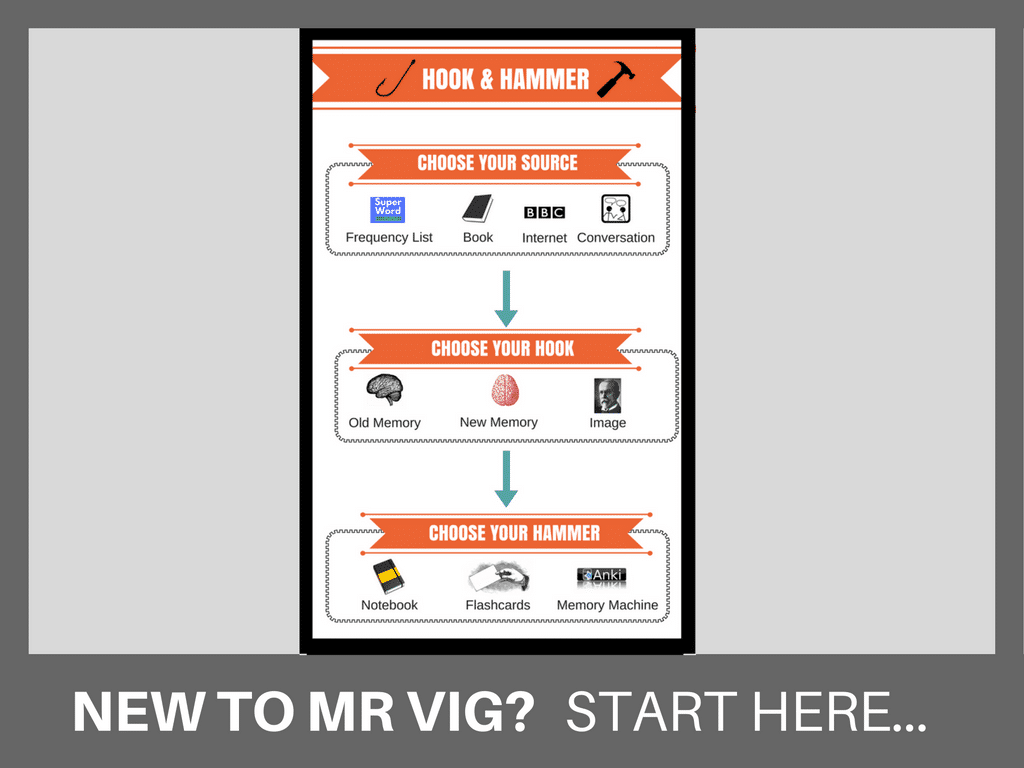
It’s the same technique used by the world’s fastest language learners.
It’s the same concept employed by guys and girls who win memory competitions.
And it’s what I teach my private students.
Because let’s be honest, the old methods…the traditional methods… the methods you and I and all of us learned in school…
Well, they’re good for passing tests, and just about nothing else.
And the main reason is… they don’t address…
You see a new word…
You find it in the dictionary…
You think “Hmm, could be useful. I should learn it.”
And then… you forget it.
Sound familiar?
Maybe you forgot it instantly.
Maybe it was after ten minutes.
But you forgot it.
Well, as we say in English, welcome to the club.
The #1 problem with building a huge, native speaker vocabulary is in fact not learning, it’s forgetting.
The problem is your memory.
But here’s an interesting fact:
Forgetting is normal.
Let me introduce you to a graph you’re going to see a lot of in the blog:
This is the curve of forgetting.
It shows how good – no, how really fantastic! – the average person is at forgetting new information.
We’re all experts when it comes to erasing memories.
It’s the truth.
But it’s not your fate.
Because if your goal is fluency, then in front of you are probably thousands of words you not only need to learn, but remember, and then use.
So how do you do that?
Imagine you’re camping in Norway.
It’s a windy day.
It’s getting dark.
And it’s time to make camp.
So you pitch your tent.
But that’s not enough.
It could blow away.
You need to hook the tent to the pegs.
And you need to hammer the pegs into the ground.
Now your tent is secure.
It’s not going anywhere.
And now you’re ready to switch this analogy to your memory.
Because your mind is also a windy place.
Read an address, hear someone’s name, or try to put a new English word in there, and it’s probably going to blow away.
Unless…
A hook is a connector.
Fishing hooks connect the fish to the pole.
Christmas ornament hooks connect the ornament to the tree.
When you hook a new word, you connect it to something that’s stable and not going to blow away.
There are three hooks I recommend.
[video_player type=”youtube” width=”560″ height=”315″ align=”center” margin_top=”0″ margin_bottom=”20″]aHR0cHM6Ly95b3V0dS5iZS9lZUZueDZaSDlrQQ==[/video_player]
I was talking with a student about his visit to the doctor.
He wasn’t sick, he just went once a year for an examination.
The word he wanted, but which he didn’t know, was “check up.”
So rather than tell it to him and move on, which would have guaranteed that he forgot it, we began to hook it.
“When was the last check up you had?”
“What did the doctor do during the check up?”
“What were the results of the check up?”
“Did you have to pay for the check up?”
Now all the memories of the check up – the sites, the smells, the feelings, the sounds – are connected to the new words.
Although we’re bad at remembering words, we’re great at remembering images.
Have you ever thought about why people say “I can’t remember names” but they rarely say “I can’t remember faces.”
It’s because the largest part of your brain is used for visual information.
And knowing this bit of information can help you remember names.
For example, I know a guy named Tomas.
I see him almost every Monday, but I never was able to remember his name.
Then I thought, who’s another Tomas I know?
I thought of Tomas Masaryk, the first President of Czechoslovakia, and an old black and white picture of Masaryk reading the newspaper in his private train car popped into my head.
And then I put the new Tomas into this picture.
In my mind I saw him sitting next to President Masaryk in his private train car asking to borrow the sports section of the paper.
And now when I see him on Mondays, I immediately say, “Hey, Tomas. How’s it going?”
This is how I learned the word for earthquake in French.
I was with some French friends at the new J. Paul Getty Museum in Los Angeles and I wanted to explain that the original museum had been damaged in an earthquake. But I didn’t know the word, so they told me.
I forgot how many years ago that was – 16…17…more? – but I remember that trip and the warm weather and the conversation.
And now connected to all those memories is the French word for earthquake.
It’s tremblement de terre.
This is why discovering words in books and articles is a good strategy. Because as you’re making the new memory of the story, you can easily connect the new words to the new memory.
Ok, so now you’ve hooked the word.
But you’re not done yet.
Because unless your hook is incredibly strong, the wind will still probably blow it away.
Unless…
A nail doesn’t go into the wood with just one hit.
Likewise, a word doesn’t go into your long-term memory the first time you see it.
You have to see it again and again and again.
This is where the memory hammer method can be useful.
There are three types of hammers I recommend.
[video_player type=”youtube” width=”560″ height=”315″ align=”center” margin_top=”0″ margin_bottom=”20″]aHR0cHM6Ly95b3V0dS5iZS9DSjVacFA4dXJnMA==[/video_player]
This technique is fairly simple.
When you see a new word, you write it down.
Later, you quiz yourself.
Important: do not simply look at the word. This is like going to the gym and admiring all the pretty machines.
You must write a sentence with a gap. On one side of the page is the sentence, on the other the new word.
And then cover one side of the page and quiz yourself.
This is the method I used in school to learn hundreds of Latin vocabulary words.
I liked it better than a notebook because it was more active; I had to actually move the words. Plus, I could save time by putting the easy words in a second stack and focus just on the difficult ones.
Some call them spaced repetition systems.
Others call them smart flashcards.
I call them memory machines.
These are software programs like Anki, Brainscape, Quizlet and SuperMemo.
The main advantage these programs have is they use an algorithm to delay the reviews.
If you review the same word every day that’s good.
But if you wait to review the word until you’re juuuuuust about to forget it…
Until it’s a little bit difficult to remember…
Until it’s on the tip of your tongue…
Then you’ll get a memory boost of 20 to 50%.
Plus, they’re fun. It’s like a game.
by Mr. Vig

Reading is one of the best methods for improving your vocabulary.
The same is true for watching TV.
But…like with anything, there’s a right way and a wrong way.
Here’s one lesson I learned from a student.
“I bought the DVD box set of ‘Friends'”
My student and I were talking about what TV shows he could watch to increase his English input.
“Great,” I said. “How many have you watched?”
“Just one episode,” he said.
“Why just one?”
“Because I don’t like ‘Friends’.”
“Well, what do you like?”
“‘Sex and the City’.”
“So why did you buy the “Friends” box set?”
“Because my last teacher told me “Friends” was a good show for improving your English.”
Oof! Can you see his mistake?
For my student, “Friends” was interesting.
But “Sex and the City” was compelling.
Interesting is a clever advertisement on the side of the highway you glance at for a second.
Compelling is car accident that you slow down to stare at because you have to look at it, even though you know you shouldn’t.
Interesting you’ll look at once.
Maybe.
Compelling you have to watch every day.
The articles in text books are interesting.
The news story about the actress whose dress fell off while she was walking onto the stage at the Oscars is compelling.
For me, it was the TV show “Lost.”
I would put on an episode an hour before my bed time, then at the end of the episode I would convince myself that it wasn’t that late and I could watch just one more.
And then at the end of the second episode, I convinced myself that I could sleep later in the morning.
And pretty soon it way past my bedtime and the next day I was exhausted, but I did it again the next night, and the next (until I got so lost in the story I stopped caring).
It was like I was addicted.
When I meet someone who’s fluent in English, I often ask them how they learned. Very rarely do they tell me about the CAE exam or a business English text book or how many vocab words they memorized.
Usually they tell me about something compelling they found, which also happened to be in English.
My Puerto Rican friend Leslie told me she started reading the “Sweet Valley High” books when she was a teenager.
My Dutch friend Niki told me she found some comic books that were only in English.
My Turkish friend Cenk told me he started watching “The Simpsons.”
What if you found something compelling in English?
What if it was so compelling it was like a drug and you had to watch it or read it or listen to it?
What if you became addicted to it?
How fast do you think your English would improve?
Image of farmer by Annelogue taken from Flickr, under Creative Commons licence.
by Mr. Vig

This is my neighborhood in Prague.
Notice the two tourists looking at the giant map?
Like a lot of European capitals, we get a lot of tourists. Read More >
by Mr. Vig